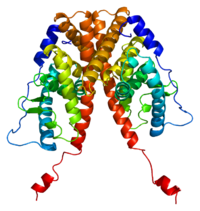
Photo from wikipedia
Retinoblastoma binding protein 2 (RBP2, also known as JARID1A), a member of the JARID1 family of histone H3 lysine K4 demethylases, has been considered to have an oncogenic potential in… Click to show full abstract
Retinoblastoma binding protein 2 (RBP2, also known as JARID1A), a member of the JARID1 family of histone H3 lysine K4 demethylases, has been considered to have an oncogenic potential in several types of human cancers including breast cancer. Although physical interaction between RBP2 and estrogen receptor (ER), a crucial factor for hormone-dependent breast cancer, has been implied, the role of RBP2 in ER-positive (ER+) breast cancer remains largely unknown. Here, we demonstrate that RBP2 is a novel therapeutic target for tamoxifen resistance in ER+ breast cancer as an ER co-regulator and an activator of receptor tyrosine kinase (RTK) signaling. In large cohorts of breast cancer patients including METABRIC, high expression of RBP2 was associated with poor response to tamoxifen therapy in ER+ breast cancer. Consistently, RBP2 induced tamoxifen resistance in ER+ breast cancer both in vitro and in vivo. Using RNA-sequencing analysis, we identified that many RBP2 target genes are overlapped with ER-dependent- and tamoxifen resistance-associated genes. Mechanistically, RBP2 induced not only hyperactivation of ER-dependent transcription but also estrogen agonist activity of tamoxifen-bound ER via the interaction with ER, thus increasing the expression of NRIP1, a co-repressor of ER. RBP2 also formed a transcriptional repressive complex with ER, NRIP1, and HDAC1 to induce H3K4 demethylation-mediated epigenetic gene silencing of IGFBP4 and IGFBP5, leading to the activation of IGF1R and its downstream, PI3K/AKT pathway. Furthermore, enhanced AKT phosphorylation by RBP2 was mediated by not only IGF1R but also EGFR/HER2 signaling via increasing the stability of EGFR and HER2 proteins in a demethylase activity-independent manner. We further confirmed that combinational treatment with tamoxifen and PI3K inhibitor BKM120 restored tamoxifen sensitivity in RBP2-overexpressing breast cancer. Taken together, these findings suggest that RBP2 mediates tamoxifen resistance in ER+ breast cancer by altering ER activity and activating IGF1R and EGFR/HER2 signal pathways in both a histone methylation-dependent and -independent manner. Therefore, RBP2 may be a promising prognostic marker and therapeutic target for endocrine therapy-resistant breast cancer. Citation Format: Hee-Joo Choi, Taekwon Son, Hyung-Yong Kim, Kyueng-Whan Min, Young-Ha Oh, Jeong-Yeon Lee, Gu Kong. RBP2 promotes tamoxifen resistance by altering ER function and activating IGF1R and EGFR/HER2 signaling in histone methylation-dependent and -independent manners in breast cancer [abstract]. In: Proceedings of the American Association for Cancer Research Annual Meeting 2017; 2017 Apr 1-5; Washington, DC. Philadelphia (PA): AACR; Cancer Res 2017;77(13 Suppl):Abstract nr 3606. doi:10.1158/1538-7445.AM2017-3606
Journal Title: Cancer Research
Year Published: 2017
Link to full text (if available)
Share on Social Media: Sign Up to like & get
recommendations!